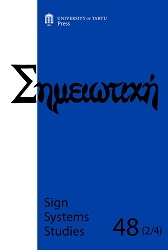Uexküll Studies after 2001
Uexküll Studies after 2001
Author(s): Kalevi KullSubject(s): Semiotics / Semiology, 19th Century Philosophy, Contemporary Philosophy, Philosophy of Science, Phenomenology, Hermeneutics
Published by: Tartu Ülikooli Kirjastus
Keywords: bibliography; biosemiotics; history of ideas; Jakob von Uexküll; philosophy of biology; theoretical biology; umwelt;
Summary/Abstract: Jakob von Uexküll’s (1864–1944) work was influential at the time of the biosemiotic turn in semiotics in the 1990s and, together with the hermeneutic and phenomenological approaches, laid the basis for a semiotic turn in biology without losing a connection to the morphology and physiology of organisms. His work appears to be attractive and promising in transforming the culture–nature divide into an understanding of the difference between the living and the non-living. The biological study of subjectivity makes the Uexküllian approach pertinent to the 21st-century changes both in the humanities and in biology, as the acceptance of his theoretical biology marks the start of a post-Darwinian era after the long period of neo-Darwinism that dominated the 20th-century biological thought. A review and bibliography of 20th-century Uexküll studies was published in 2001; the following provides a bibliography of Uexküll studies in the two decades after 2001.
Journal: Σημειωτκή - Sign Systems Studies
- Issue Year: 48/2020
- Issue No: 2-4
- Page Range: 483-509
- Page Count: 27
- Language: English

